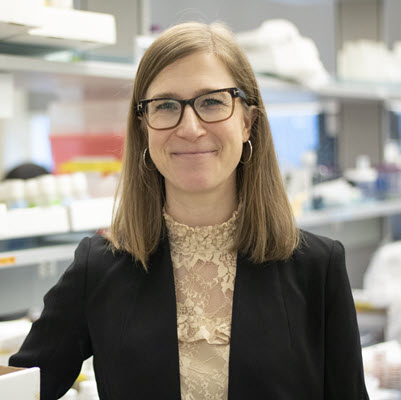
Research Interests
Aging, Cell Biology, Cell Signalling, Developmental Biology, Growth control, Metabolomics, Sex differences, Stress responses
Research Focus Teams
Cardiovascular, Diabetes, Aging, Obesity, Fertility
Departments
Cellular & Physiological Sciences
Contact
Email: elizabeth.rideout@ubc.ca
Office Phone: phone: 604–822–0623
Publications
Lab Website
Dr. Elizabeth Rideout holds a CIHR Sex and Gender Science Chair in Genetics, and is a Michael Smith Foundation for Health Research Scholar. Dr. Rideout is an Assistant Professor at The University of British Columbia (UBC) in Vancouver, Canada, where she is affiliated with the Life Sciences Institute, the Women’s Health Research Institute at BC Women’s Hospital, and the UBC Women’s Health Research Cluster. Dr. Rideout completed her BSc (Hons) at the University of Toronto at Mississauga in Forensic Science and Biology. She first became interested in research working with fruit flies in the laboratory of Prof. Marla Sokolowski, prompting a move to the laboratory of Dr. Stephen Goodwin at the University of Glasgow to study sex-specific brain development and behaviour in flies. This work led to publications Rideout et al. (2007) and Rideout et al. (2010). For her post-doctoral research, Dr. Rideout joined the lab of Dr. Savraj Grewal at the University of Calgary to study the regulation of growth and metabolism during development. This work led to several publications: Rideout et al. 2012, Marshall et al. 2012, Ghosh et al. 2014 and Rideout and Grewal (2015).
Education
Postdoc: University of Calgary (2009-2015);
University of Glasgow (2007-2008)
PhD: University of Glasgow (2004-2007)
M.Res.: Molecular Functions in Disease, University of Glasgow (2003-2004)
BSc (Hons): Forensic Science and Biology, University of Toronto at Mississauga (1999-2003)
The main focus of the lab is to understand how male-female differences in the regulation of growth and metabolism contribute to sex differences in body size, stress responses and lifespan
Regulated growth is essential for attaining the correct cell, tissue and organismal size – too much or too little growth during development causes growth disorders. Even after development is complete, the regulation of growth is essential for tissue repair and replacement during the whole of an animal’s life. In this case, deregulated growth disrupts tissue homeostasis, leading to an increased risk of cancer, and/or shortened lifespan. Therefore, understanding the mechanisms that control cell, tissue and body growth is not only a fundamental question in biology, but has significant implications for health research.
An important determinant of growth in all animals is sex. Male-female differences in cell, tissue and body size are widespread in the animal kingdom. In addition, the incidence and progression of some forms of cancer show a strong sex bias. Yet how the regulation of growth differs between males and females to produce these differences in size and health outcomes remains unclear. In our lab, we use the fruit fly, Drosophila melanogaster, as a model to study the genetic, molecular and physiological mechanisms that control male-female differences in cell and body size.
Our studies have uncovered many parallels between the sex-specific regulation of growth in flies and in mammals. The focus of our research is to use the power of Drosophila genetics to identify pathways that are regulated by sex, and to investigate how this regulation affects growth. In doing so, we will identify new roles for many pathways in controlling sex differences in cell, tissue and body size. Since many of these pathways also play roles in stress responses and lifespan, studying how their regulation and function differs in males and females will provide insight into sex differences in stress survival and aging.
For more details and research projects, visit the lab website: http://rideoutlab.weebly.com/research.html.